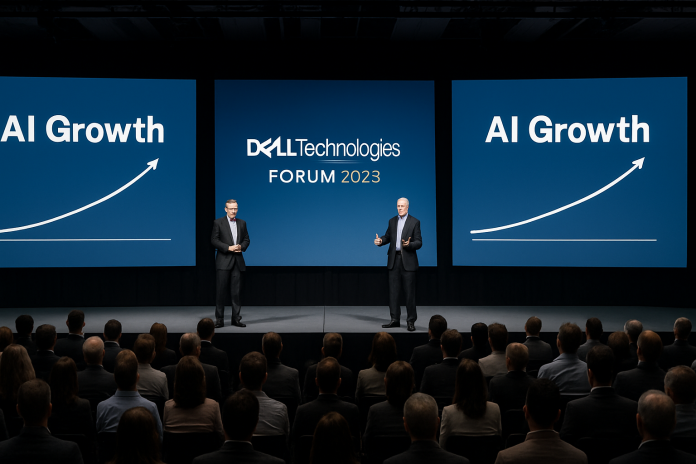Dell Technologies says artificial intelligence will drive 25-35% compound annual growth across India’s digital sectors, with AI integration expected to add billions to the country’s GDP by 2030. The projection came from analysis presented at Dell Forum 2025.
More than 2,000 executives attended sessions in Bengaluru and Mumbai.
Quick Take
- 2,000+ executives attended Dell Forum 2025 across Bengaluru and Mumbai focusing on AI economic impact
- India’s AI market projected 25-35% CAGR according to VARINDIA analysis presented at forum
- Dell Technologies estimates AI integration will add billions to India’s GDP by 2030
- Strategic sessions addressed cybersecurity risks and talent shortage challenges
- Leadership discussions led by Dell’s Asia Pacific President Peter Marrs and India President Manish Gupta
Dell Technologies positioned artificial intelligence as India’s next economic catalyst at its flagship Dell Forum 2025. The event drew over 2,000 industry leaders to major sessions in Bengaluru and Mumbai. The technology company emphasized how AI, combined with robust digital and physical infrastructure, can accelerate India’s transformation into a global innovation hub by 2030.
According to SEVADV economic analysis presented at the forum, Peter Marrs, Dell’s Asia Pacific President, delivered the central message that Indian enterprises must rapidly integrate AI applications to capture projected GDP growth measured in billions of dollars.
Market Growth Outpaces Traditional Technology Adoption
The forum highlighted India’s exceptional position in global AI adoption. Market analysts are projecting 25-35% compound annual growth rates across IT and digital sectors. VARINDIA analysis presented at forum research presented during sessions showed this growth trajectory significantly outpaces traditional technology adoption cycles.
Manish Gupta, Dell India President, outlined how digital modernization through AI deployment creates cascading effects. These range from advanced payment systems to startup ecosystem acceleration. The presentations demonstrated AI’s role in enhancing productivity across manufacturing, services, and emerging technology sectors.
Infrastructure Investment Addresses Market Barriers
Sustainability emerged as a core theme. CXOToday coverage highlighted energy-efficient AI solutions that meet regulatory compliance standards. Technology experts including Venkatesh Sitaram provided practical frameworks for overcoming market-specific challenges through strategic AI implementation.
Dell’s newly announced Automation Platform specifically targets barriers identified in Indian market research. This includes cybersecurity vulnerabilities and skilled talent shortages. The platform offers hybrid cloud models designed for India’s diverse business landscape, from large enterprises to emerging startups.
Public-Private Partnerships Shape Innovation Strategy
Sam Burd, Dell’s Chief Strategy Officer, led collaborative sessions focused on establishing India as a global AI innovation center. These discussions produced actionable blueprints for public-private partnerships and cross-industry collaboration frameworks.
According to Digital Terminal analysis, the forum’s strategic recommendations emphasize hybrid cloud adoption and infrastructure investment as prerequisites for sustainable AI growth. Participants developed sector-specific implementation timelines extending through 2030.
Market Implications Signal Competitive Advantages
The forum outcomes suggest significant near-term opportunities for enterprises ready to invest in AI infrastructure. However, success requires addressing talent development challenges and cybersecurity frameworks that can scale with rapid AI adoption.
Dell views India as a critical growth market where AI deployment can generate substantial economic returns. The company also sees potential for establishing competitive advantages in global markets. The emphasis on collaborative approaches suggests recognition that sustainable AI growth requires ecosystem-wide coordination rather than individual company initiatives.






